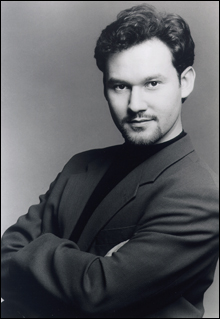
MARIUSZ KWIECIEN: Could anyone not be seduced by his Don Giovanni?
|
Tanglewood 2006 may well be remembered as the summer of James Levine’s Don Giovanni. The opera that’s often referred to as Mozart’s greatest, or at least his most ambitious, like King Lear almost never completely succeeds in performance. There’s just too much in it — comedy and tragedy (it’s called a dramma giocoso — a jocular drama) and large, even cosmic, issues of morality, personal liberty, the pleasures of sexual excess (as a means of self-definition) and the torments of Hell. Lorenzo da Ponte’s libretto is brilliantly constructed, and Mozart’s music is one of the glories of Western culture. But last weekend, Levine assembled a remarkable cast of singers who could also act, and he led the BSO, at the top of its game, in a magnificent realization of this astonishing masterwork. This “semi-staged” concert version captured more completely than any fully staged performance I’ve ever seen, and with quicksilver fluidity, both the opera’s high hilarity and its dark profundity.
As Don Giovanni, charismatic young Polish baritone Mariusz Kwiecien (kvee-AY-chen) did nothing to diminish this ruthless aristocrat’s despicability, his relentless search for self-gratification at anyone’s expense. Yet with his powerful, Burgundy-rich voice and startling good looks, how could anyone not be seduced? And how could one not admire him for living completely on his own terms, even to resist eternal damnation, going to Hell for his refusal to accept the conventional morality of his inferiors? He tossed off the tongue-twisting patter of the “Champagne Aria” with glittering abandon and the mandolin serenade with languorous allure.
Two late substitutions were also welcome ones. Georgian soprano Tamar Iveri replaced Barbara Frittoli as the raped Donna Anna and sang with heroic power, luscious warmth, and impassioned dignity. As Leporello, Giovanni’s reluctant manservant, young Italian bass-baritone Luca Pisaroni (replacing veteran Ferruccio Furlanetto), pointed every phrase with comic mastery, and he brought the house down with the aria cataloguing his master’s conquests. (The catalogue itself was the opera’s thick score, handed to Leporello by Levine himself.) Changing places with Giovanni, this Leporello also did a devilishly accurate imitation of his master’s voice.
I was struck by the way each of Giovanni’s three attempted victims — Anna, the seduced and abandoned Donna Elvira (who still loves him), and the peasant girl Zerlina (on her wedding day!) — sang in a different timbre. Finnish soprano Soile Isokoski, with a lighter voice than Iveri, made a comic but deeply touching Elvira. (She perused that catalogue with horrified disbelief.) American soprano Heidi Grant Murphy, a favorite of Levine’s, was almost too lightweight for Zerlina, but she had flair and a silvery tone.
The singer with the hardest job was also one of the most successful. Don Ottavio, Anna’s fiancé, can be a pretty thankless role. Despite singing two of Mozart’s most ravishing tenor arias, he still comes off as blandly ineffectual. But American tenor Matthew Polenzani has perhaps the finest tenor voice of his generation, and he sang with aristocratic elegance and potency. Although his situation was hopeless, he was a man in control. When Anna admits that for a moment she thought he was the man who had invaded her room, you could believe it was possible. I’ve never heard Ottavio’s first aria, “Dalla sua pace” (“On her peace mine depends”), sung more beautifully or expressively. Baritone Patrick Carfizzi was a pathetically sweet Masetto, Zerlina’s hapless fiancé, and bass Morris Robinson, who only a few years ago graduated from BU’s Opera Institute, then with the Boston Lyric Opera sang the Commendatore, Anna’s murdered father, and, later, his ghostly statue, repeated that role with even greater success in more stellar company.
Levine’s suavity, wit, and sabertooth urgency, along with the pointed minimalist staging (apparently by Levine himself), allowed us to hear with extraordinary clarity the powerful parallels Mozart and da Ponte created. (Both acts end with unwanted guests coming to a party; both end with a “voice of vengeance.”) John Oliver’s Tanglewood Festival Chorus didn’t have as much to do as in its stunning work in the next day’s Mozart Requiem, but it was one more crucial cog in Don Giovanni’s miraculous success.

MATTHEW POLENZANI: For once, a Don Ottavio who was in control.
|
Richard Strauss wanted to write a Mozart opera, but before he did (his Rosenkavalier was clearly inspired by Mozart’s Figaro), he composed two of his most notoriously expressionistic, hallucinatory, un-Mozartian masterpieces, Salome (1905) and Elektra (1909). After his great success last summer leading the Tanglewood Music Center Orchestra in two monumental acts from Wagner’s Ring Cycle, Levine put this summer’s stupendous students to an even harder test with Elektra — two hours of relentless, intermissionless intensity. Once again they passed with flying colors, capturing Strauss’s raging power and moments of eerie dementia. (Were these discombobulating quiet passages the ones he said — surely in jest — should be played like Mozart?) Levine (did I say how trim and fit he now looks after his months of R&R after his shoulder injury?), with minimal gestures, wrung out every drop of drama and irony and emotional turbulence, and the players reveled in it.
The professional cast was good if not impeccable in every detail. British mezzo-soprano Felicity Palmer, as the tormented and then (momentarily) triumphant Klytemnestra, got both the queen’s motherliness and her cruelty. Her final laugh (before her final scream) was the most chilling moment in the performance. Her BSO predecessors were the legendary Christa Ludwig and Maureen Forrester. Palmer turned this illustrious duo into a triumvirate.